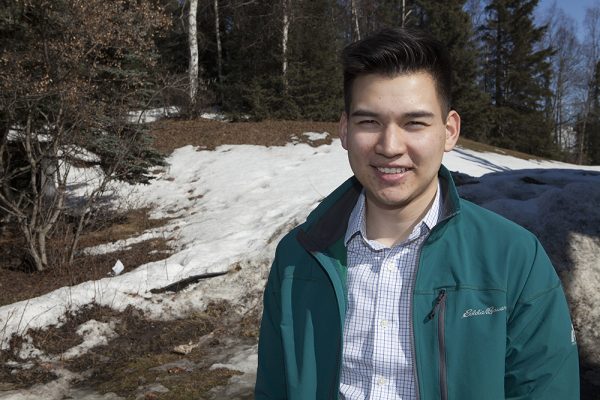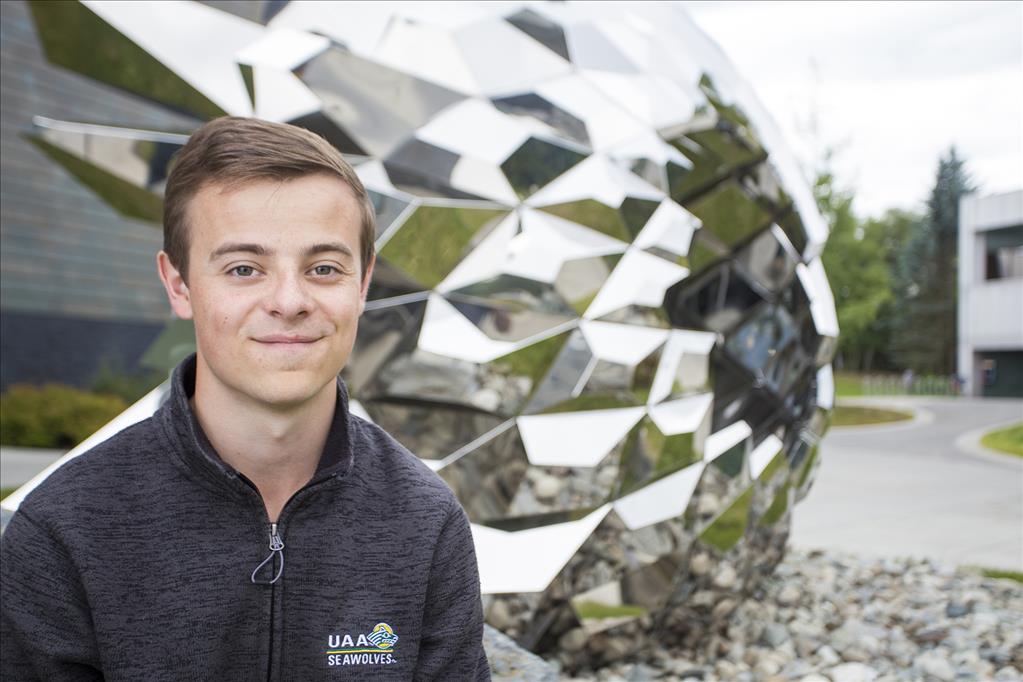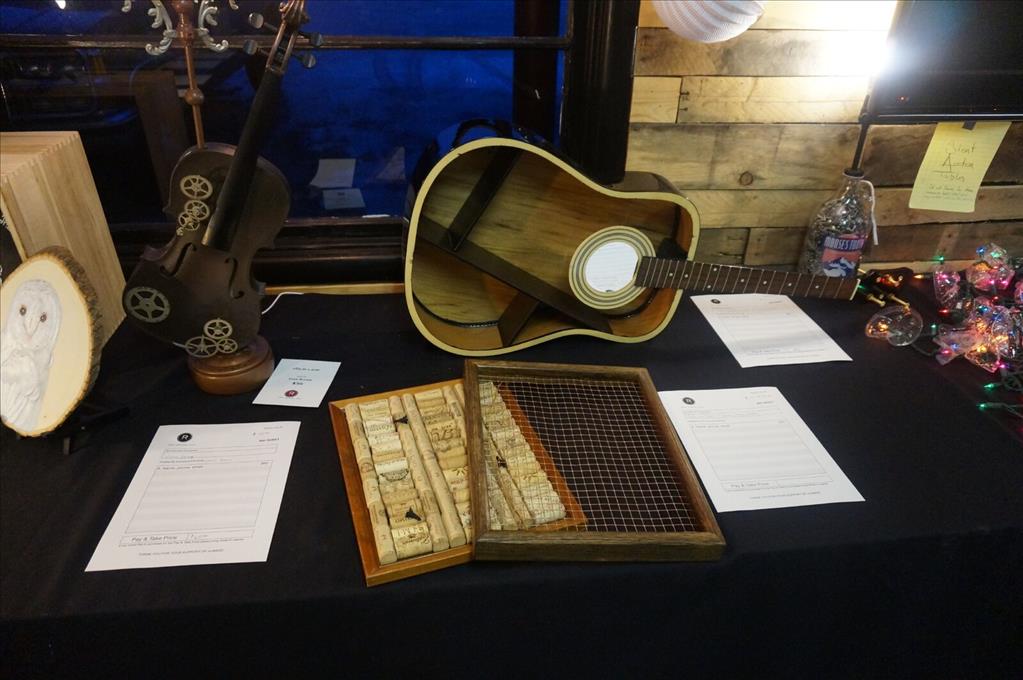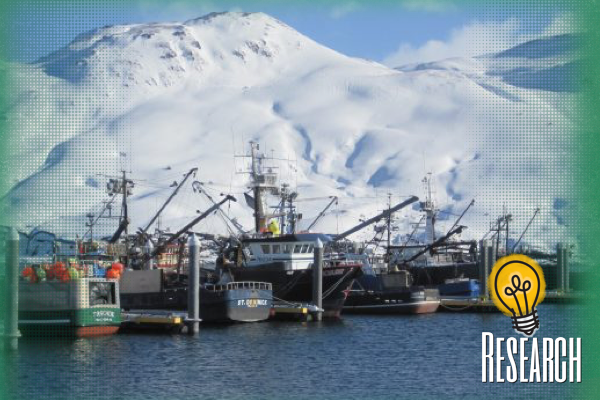Q & A with Jacob Shercliffe, UAA's latest Truman Scholar
by Tracy Kalytiak |

UAA economics student Jacob Shercliffe is one of 62 people nationwide named this year as a Truman Scholar. (Photo by Philip Hall / University of Alaska Anchorage)
Jacob Shercliffe's father runs the simulation lab for UAA's College of Health. His mother helps manage the electronic health record for the Veterans Administration facility in Anchorage. His sister, UAA alumna Rachel Shercliffe, is enrolled in medical school in Michigan. And his brother graduates next month with a biology degree from UAF.
"I am the black sheep of the family," said Jacob, a member of Seawolf Debate and Model U.N., "because they all have health-related careers/education and I study political science and economics."
Jacob recently received the honor of being named Alaska's sole Truman Scholar for 2017 - one of 62 Truman Scholars selected this year out of an initial 768 nominations, nationwide.
The Harry S. Truman Scholarship Foundation provides up to $30,000 to each Scholar in support of graduate study. Criteria for the honor include exceptional leadership potential, commitment to careers in government or public service and academic achievement.
Previous Truman Scholars from UAA (and its predecessor institution, Anchorage Community College) include Jonathan M. Karpoff (1977); Ronee Miller (1983); Becky L. Gay (1981); Margaret R. Simonian (1990); Glenn D. Boledovich (1992); Anna Zaroff (1997); Erin L. Trimble (2003); Miranda Zindel (2006); Umair Iqbal (2007); Candace Renee Lewis (2008); Deana Katherine Glick (2009); and Brett J. Frazer (2011).
Jacob talked to us about his life, activities and future plans:
Where were you born and raised, and where did you go to school before coming to UAA?
I was born in Colorado Springs, Colorado, but I never really knew the place. Trying to describe where I was "raised" is a bit of a challenging question. My parents are both ex-Air Force so we moved around a lot as a kid. I've lived in Panama, England, and Maryland before moving up to Alaska in the 5th grade. I went to Homestead Elementary School out in Eagle River for a year before starting junior high at Mirror Lake Middle School. I graduated from Chugiak High School in spring of 2014 and enrolled here at UAA in the fall.
What activities did you engage in when you were in high school?
I was a jack of all trades, master of none. I played lots of instruments in band, mainly the French horn. I sang in my school's choir. I was an AP student with general interests in most subjects, particularly my government class. I played tennis, basketball, soccer, and swam. As a senior in high school I started debating; this would turn out to change my life forever.
Why debate?
My relationship with debate is hard to describe to other people. In many ways, it was like a religion. It has taught me how to think and how to perceive the world. It has opened opportunities to travel the world and meet incredibly interesting people. Debating was the first thing that really clicked in my life. (Off the record: I don't often admit to it, but I am a fairly intelligent person.) However, debating made me excited and passionate to learn about the world and how it worked more than anything else ever has.There was no debate program at my high school, so I went to Eagle River High's team. Thankfully, their coach took me under her wing and helped me learn the ropes. I was a very unconventional debater - much more of a storyteller than I was a technical debater, but it served me well. I ended up making a pretty decent run at the state tournament from being a complete nobody only a couple of months earlier. Steve Johnson came to my semifinal round and was apparently impressed (who knows how) and told me I should come to UAA. The rest is history.
What other factors motivated you to come to UAA?
The answer is horribly boring and practical. The first reason is cost. Since high school I knew I was going to graduate school at some point and UAA made a lot of sense financially. Once I got here I realized that I was getting a private school education at a public school price. I have talked to friends at Ivy League schools who have all their courses taught by grad students and it takes weeks to get an office hours appointment. Here, I will randomly see professors in the hall and they will stop to chat for half an hour. A lot of the faculty here will go out of there way to help with projects I am working on or point me to new opportunities.
Another major factor was our debate team. The Seawolf Debate team has an amazing reputation and I had some friends who were going to join. Steve recruited me out of high school and it seemed like a fun idea at the time. The final reason I chose UAA is so I could stay close to home to help out my family and continue to give back to my community.
What has your experience in Seawolf Debate been like?
Joining the debate team was a terrifying experience because I looked up to so many people on it, but soon it became a second family. I like the abstract, esoteric idea of deliberation and discourse, but I stick around because the people were incredibly kind and pushed me to be better than the mediocre student/person I was at the time.
What drew you to Model U.N.?
MUN is like an extension of debate, but for a different audience. MUN gave me a lot of opportunities for leadership and to be on the other side of a mentor/mentee relationship. I like teaching students that there is more to the world than the little bubbles that they live inside. In addition, I found amazing friends who were similarly willing to engage in big ideas, albeit in a much more relaxed environment than the debate team. Model United Nations is one of those things where the experience sticks with you for a really long time. I still look back fondly on the early days when I knew nothing and people would help show me how I could learn more about international relations. Now I get to do that for others.
You chose economics as your major. What aspects of economics resonated with you, and what do you hope to do with that degree after your graduate?
To be brief, markets and incentives. I wanted to know why people did the things that they did. I heard once from a professor of mine - likely Kyle Hampton - that political science is the study of things that don't move - institutions, bureaucracy, etc. - and economics is the study of things that do - capital, markets, money, etc. That has sort of stuck with me ever since. I wanted to figure out how to solve all the problems that I saw around me and wanted to figure out whether or not policies like a minimum wage was a good idea or not. Three years later I can describe the problem in a lot more detail and talk about solutions that might work in certain circumstances, but part of the fun is that it I am not really "closer" to an answer than I was when I started. Issues like economic redistribution are fascinating, but impossibly complex as well.
Which faculty members have influenced you the most in your time at UAA, and why?
Steve Johnson - The best mentor I have ever had in my life. At times, I forget he is my debate coach because he is somewhere between a friend and a therapist. He will probably hate me for saying this, but we are very similar people. We perceive and think about things in similar manners, he just has them much more figured out than I do. He has probably taught me more in my time here than both of my degree programs combined. That's just sort of the way debate works, I guess.
Kimberly Pace - By far the kindest and most generous human being I have ever met. Kimberly got me involved with MUN and I also took a few Political Science classes from here as well. It would be easy to talk about all the factual and academic things she has taught me, but caring for other people and helping others is probably the most important lesson.
Kyle Hampton - The best lecturer I have ever seen. A bit of a narcissist (by his own admission), but wicked smart and incredibly good at making people excited to learn. He understands students in a way most other professors do not seem to.
John Mouracade - I took an Honors College course from him and he pushed me to be more "Renaissance man"-esque throughout. He is one of the reasons I like learning for the educational value, not because of the tangible benefit it may have for me some day.
Jim Muller - He helped me immensely with the Truman application, as he is the faculty rep. I could talk for a long time about the countless hours we spent reviewing that document and discussing my life and character in preparation for the interview. Also, he is one of the few professors here who truly treats his students like they are the best and brightest in the country. The man's reading lists are terrifying, but that means you are getting an education as good as, if not better than, a Harvard education. I have a lot of respect for that, even if it means I am constantly trying to catch up on my reading because of the blistering pace of his class.
Where were you and what were you doing when you first learned you had been named a Truman Scholar?
I was in my History of Political Philosophy 2 class. The chancellor and the dean of the College of Arts and Sciences came in with doughnuts and balloons. I had already resigned myself to not winning because the official release date was only a couple of days away, so I was really shocked about it all. They came in and told me I had won and I think I just sat dumbfounded for a couple of minutes.
What were your thoughts about receiving that honor?
I am completely blown away. I was born with a massive inferiority complex and it is a real challenge for me to conceptualize being someone who is deserving of such an award. It is a real honor, but saying I am proud of myself isn't quite right. My successes are really and truly a reflection of the immense amount of time and work people have put into me. The old adage "It takes a village" applies well to me. There are a ton of people who have helped me get to where I am now. I find it really bizarre that "I" am the one who gets all the praise. The real story is one of numerous mentors, friends, and family who have been patient with my idiotic self for long enough to beat something into my brain. I am eternally grateful for them, irrespective of this award, but am incredibly thankful I was selected. This will open a ton of cool opportunities and paths I never would have been able to do otherwise.
Compiled by Tracy Kalytiak, University of Alaska Anchorage.
 "Q & A with Jacob Shercliffe, UAA's latest Truman Scholar" is licensed under a Creative Commons Attribution-NonCommercial 4.0 International License.
"Q & A with Jacob Shercliffe, UAA's latest Truman Scholar" is licensed under a Creative Commons Attribution-NonCommercial 4.0 International License.














